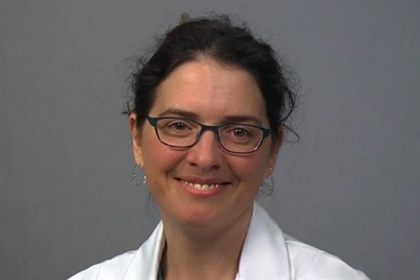(MARCH 6, 2024) Ophthalmologist Jessica McNally, M.D., assistant professor of surgery, emphasized to NBC5 the importance of using the correct protective eyewear when viewing the April 8 solar eclipse.

Ophthalmologist Jessica McNally, M.D., assistant professor of surgery
(MARCH 6, 2024) In anticipation of the total solar eclipse on April 8, ophthalmologist Jessica McNally, M.D., assistant professor of surgery, emphasized to NBC5 the importance of using the correct protective eyewear to prevent permanent vision damage.
The material in eclipse-viewing glasses is so dark, you’ll be able to use them to safely look at the sun during the onset of the total eclipse, and after totality (the approximately three minutes of total blackout during which the moon blocks the view of the sun). Experts say you should seek out eyewear with a logo reading “ISO,” which is a code telling you the eyewear was specifically made to look at the sun.
McNally stressed how important it is to put those eclipse viewers back on right after totality if you remove them during peak darkness, because ultraviolet light from looking at the sun—even for what seems like a short amount of time—can damage the sensitive back of your eye. That could lead to spotty vision, wavy vision, or loss of vision, she warned.
“This can potentially cause permanent vision damage,” the ophthalmologist said in an interview with NBC5 News. “The symptoms are most dramatic initially. They do fade a little bit, but with some of the specialized testing that we have available in our offices, we can still see the damage on the microscopic level. So, even if there is some visual recovery, the actual physical recovery of the back of the eye doesn’t necessarily happen. You can still have permanent damage from this exposure to the ultraviolet light.”
McNally said some people have asked if you can use other things, like maybe a welder’s helmet, to view the eclipse. She said it’s definitely much, much better and safer to seek out those glasses with the ISO label. That eyewear is widely available online. Additionally, hosts of many group-viewing events on April 8 are providing guests with proper viewing glasses. If you’re attending one of those, experts recommend checking with organizers about whether they will provide those protective glasses.
Read full story
at
NBC5